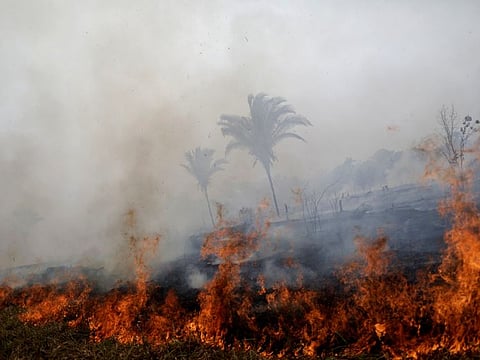An ecological crime against humanity
Illegal fires in Amazon represent a grave threat to our fight against climate change

A heavy pall of smoke hangs over the Brazilian city of Sao Paolo where 2,500 kilometres away, thousands of illegal fires are destroying vast tracts of the Amazon forest. Every minute, researchers and analysts say, an area the size of five football fields is erased by the flames in a deliberate move to turn the forest into land suitable for beef production. In short, this is an ecological crime of genocidal proportions.
The Amazon is vital to the world’s fight against climate change. Each day, the vast lungs of the forest remove millions of tonnes of carbon dioxide from our atmosphere — key to trying to control global warming. Two-thirds of the world’s plant species are unique to that region, its vast wildlife representing one third of the wild animals left on our planet. And the vast ecosystem is being threatened by illegal fires and a Brazilian government seemingly unwilling to prevent this crime against the planet.
Brazil must do everything in its power to stamp out these fires and prosecute those responsible. As Macron notes, intensive replanting programmes are also urgently needed.
At the G7 summit in France on Friday, French President Emmanuel Macron has asked global leaders to pressure Brazil to fight these fires and to plan huge replanting programmes. Brazil’s President Jair Bolsonaro, a right-wing leader who cares little for climate warming or the ecological threat to the Amazon, has brazenly suggested the fires were being lit by environmentalists, angering the international community.
But the world is watching, and there will be consequences. For starters, after two decades of negotiations, Merosur — the group of central and South American nations, has negotiated a key free trade agreement with the European Union. Both Macron and Ireland’s Taoiseach Leo Varadkar have said they will block that deal until South American nations force Bolsonaro’s hand. His nation too is heavily indebted, owing some $61.2 billion and the terms of renewal of those papers need to be urgently reviewed to apply pressure on the government.
We are fast approaching a time when crimes against the planet need to be treated the same as crimes against humanity. That in itself will not fix the damage caused, but it may at least be a deterrent and a clear sign that the global community takes such ecological crimes as a grave threat against us all.
Brazil must do everything in its power to stamp out these fires and prosecute those responsible. As Macron notes, intensive replanting programmes are also urgently needed. As we all see through every climate and weather event, we have little time to make a lasting difference.



